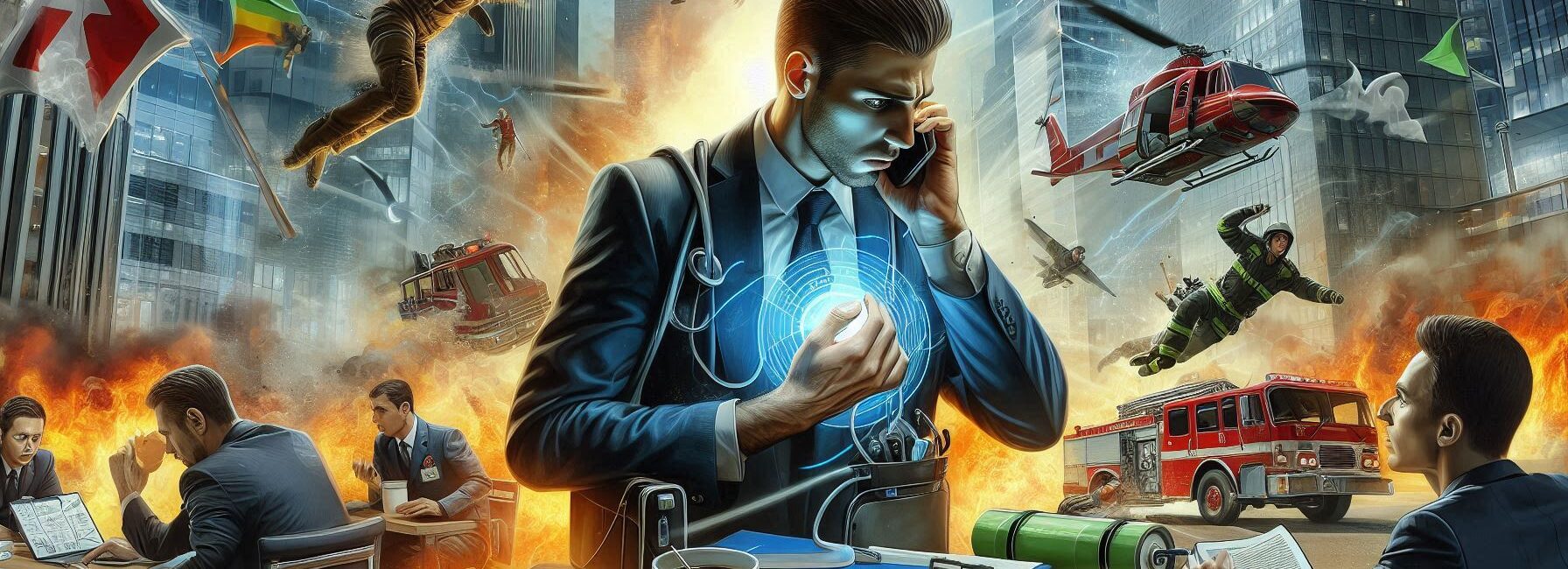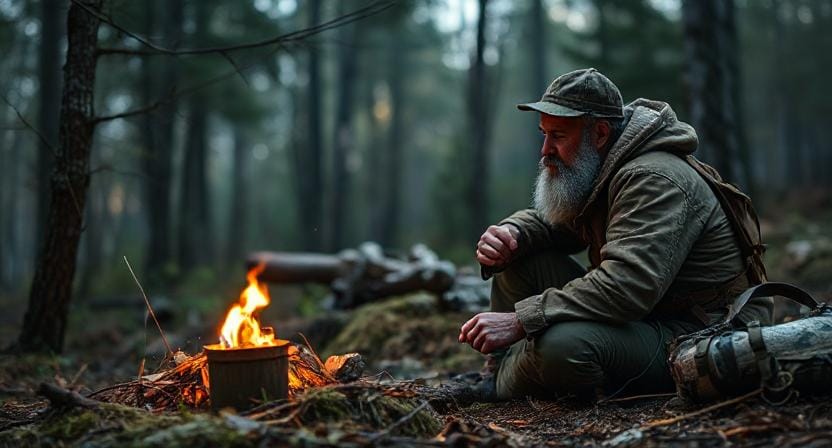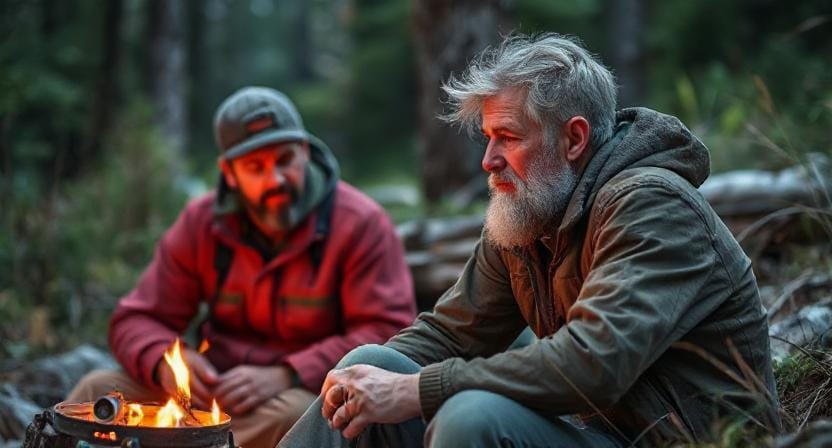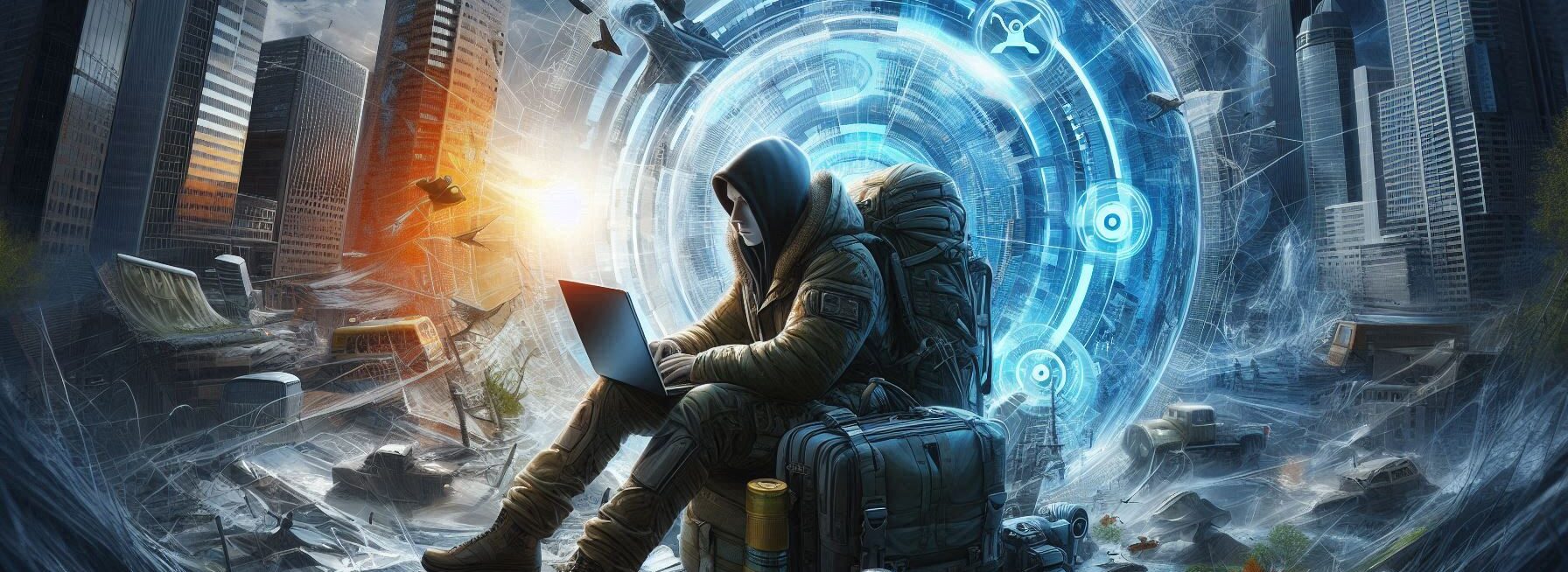Last Updated on November 2, 2025 by Kevin Collier

Top Takeaways and Key Concepts
- Stay calm under stress by taking deep breaths before reacting to situations.
- Observe carefully and gather information to identify real threats quickly.
- Prioritize actions based on safety, resources, and changing circumstances.
- Trust your instincts when something feels unsafe or unusual.
- Practice decision-making through simulations or games to improve real-life responses.
Imagine this: you're camping with your friends. The air smells like pine and the sun is beaming. You're having a lot of fun. Then, oh no! You hear something moving in the bushes. Is it just a squirrel looking for food? Or maybe it's a bear that just ate a lot at an all-you-can-eat buffet?
It's very vital to be cool in times like these. You want to tell the tale, not be the main character in the wildlife documentary, right? Let's talk about how to stay calm and make good decisions when things get a little crazy.
Please Note: This post may contain affiliate links. If you click one of them, we may receive a commission at no extra cost to you. As an Amazon Associate, I earn from qualifying purchases.
First of all, don't freak out. Breathe deeply. Keep in mind that most sounds are merely little animals hunting for food. It could be your friend trying to sneak up on you with a snack. That would be humorous, wouldn't it?
Next, be quiet for a moment. Pay close attention. You can sometimes find out what's causing the sounds. A bear and a squirrel produce different sounds. You can do this.
If you think it's something bigger, take a step back. Don't move suddenly! You shouldn't ask a bear to dance with you. It's important to stay away.
Make sure everyone in your group knows what's going on. Talk softly or use your hands. There's no need to throw a panic party. You know what? It's about working together.
It's also quite helpful to have a flashlight close by. Point it at the noise. Most animals don't enjoy it when it's bright. You might be able to scare it away.
Stay calm if you see a bear. Speak softly. Don't run. That's like playing tag and not wanting to be “it.” If you have bear spray, it can be your best friend.
When things calm down, have a good laugh about it. You could have a small bonfire and toast marshmallows. Talk about the adventure in storytelling. It will become one of those fantastic moments that you talk about for years.
*** Shop for Survival Gear - Tools - Kits ***
Survival Gear - Bags and Backpacks - Knives - Boots/Footwear - Communication
Outdoor Cooking - Gloves - Hydration - Dry Boxes - Water Filtration Systems
Tents - Sleeping Bags - First Aid Kits - Multi-Tools - Flashlights - Fire Starters
Navigation - Survival Food - Night Vision - Headlamps - Stun Guns - Binoculars
The point of camping is to have pleasure in nature. You'll have good and bad days, but being ready helps. So, remember these guidelines. You'll be ready the next time a rustling noise threatens to ruin your fun! Have a great time camping! 🏕️🌲🍫
Stay Calm: The Art of Not Losing Your Mind

First, let's speak about how to keep calm. When you are in a panic, it could feel like your brain has turned into scrambled eggs—tasty but not very helpful. But here's the thing: deep breathing can really help!
Take a deep breath through your nose like you're trying to smell cookies that just came out of the oven (and who wouldn't want that?). Then, carefully let out your breath like you're blowing out birthday candles.
When you calm down, you give yourself time to think clearly. I remember a time when my friend got lost on a trip because he thought he could follow the “sound of water.” Warning: It was only his stomach growling since he missed breakfast!
We didn't freak out and rush about like headless chickens, which is usually not a good idea. Instead, we took a moment to breathe and retrace our steps. What do you think? We saw him eating trail mix under a tree!
Get Information Quickly: Be like Sherlock Holmes

Now that you've calmed down, it's time to get knowledge swiftly, like Sherlock Holmes, but without the silly hat (unless you want that).
It's really important to know what's going on around you in a crisis. Find clues! What do you see? Listen? Do you smell? Is there smoke in the air or a lot of squirrels acting strangely?
Let's say you're at home when the power goes off unexpectedly. Take a look outside before you decide whether to get flashlights or set up camp in your living room (which seems pleasant until someone trips over the couch).
If you can, check the news or social media for updates. Sometimes those sites can give you information faster than a pal texting “OMG!” while watching cat videos.
Basically, gathering information helps you make smart choices instead of just guessing, like attempting to figure out which flavor of ice cream will save your life.
Choose Wisely Like a Jedi Master: Prioritize Your Options

It's time to put your alternatives in order when you've gotten all the information you need. Think about what's most important right now: first, stay alive; then, have dessert (sorry, ice cream lovers). You don't need to be Yoda for this; simply ask yourself a few simple questions: What do I need right now? Is it safe for me to be here? Do I have enough stuff?
If there is flooding and you can't get out of your house, it makes sense (though it hurts) to put getting out of the house ahead of finding that last slice of pizza.
If things aren't too crazy outside and you have everything under control, like keeping kids quiet when they throw tantrums about snack selections, then maybe keeping everyone peaceful should come first.
It's important to remember that priorities can change when new information comes in. You might need to think about what's most important every few minutes if things change quickly, which they often do.
Listen Up And Trust Your Gut!

When everything else fails—and believe me, it does happen—it's important to trust your gut. Have you ever had the gut sense that something wasn't quite right? Hey, pay attention! Our bodies typically sense danger before our minds do.
I went hiking with several companions who wanted us to take this “shortcut” through thick forests instead of following the well-marked pathways. My instinct told me no way; this seems more like the backdrop for a horror movie than a walk in the park!
We were glad we didn't go through with it because five minutes later we heard something moving behind us. It was a family of deer that looked bewildered, not scary, but nonetheless! Always pay attention when something doesn't feel right.
Life experiences sharpen your instincts, even if they sometimes lead you to make awful choices about what to eat (mystery meat, I'm looking at you again).
Get Ready To Make Decisions Ahead Of Time
Finally, and maybe most significantly, practice makes perfect! It's worth it to practice making decisions ahead of time, just like it's worth it to learn how to cook pasta without burning it (a true art form) or how to get around in a city jungle.
Play pretend with family or friends in situations where you have to think quickly. Set up fake emergencies where everyone has to figure out the best way to respond in a certain amount of time. At first, it might seem absurd to say, “Why are we pretending there's a zombie apocalypse?” But doing so helps us get ready for real-life scenarios in the future.
Also, doing things like team sports or escape rooms helps people work together and think strategically when things become tough, which is great practice for real-life emergencies!
Conclusion
So there you have it: making rapid decisions when things get rough isn't as scary as it appears! It helps a lot to stay calm. Take a big breath. It's fine to be a little scared. You are not the only one!
Getting information is really important. Pay attention and look around. Sometimes all you need is a moment to see things clearly. You may trust your gut. Believe it! It typically knows what to do, even when your mind is racing.
It makes a great difference to practice these abilities before you need them. You may think of it as a game. You get better the more you play! You're getting ready even if you're only watching survival shows with buddies. It can be fun to be like Bear Grylls!
Imagine yourself in a weird position. You know what to do. You are calm and cool. That feeling of confidence? It makes things easy.
You will be ready for anything that comes up when you practice. Instead of being scared, facing problems becomes an adventure. And even if things don't go exactly as planned, you'll still have excellent stories to tell later.
Keep making rapid decisions, and don't forget that you have the skills to handle everything that comes along. You can do it all, one step at a time!
Frequently Asked Questions
Why is staying calm in a crisis important?
Remaining calm helps your brain think clearly, lowers panic, and allows you to process information more accurately before responding.
How do I quickly gather information during an emergency?
Observe your surroundings, listen for cues, and verify what’s happening before acting so you avoid guessing or assuming incorrectly.
How do I prioritize actions when everything feels urgent?
Focus on immediate safety first, then evaluate your resources and adapt your decisions as new information develops.
Should I trust my instincts when something feels wrong?
Yes—intuition is often based on subtle observations your brain processes rapidly, making gut feelings useful when time is limited.
How can practice improve crisis decision-making?
Simulations, drills, and role-play scenarios help you develop faster responses, build confidence, and create automatic habits.
Can calm breathing help me think more clearly?
Deep breathing lowers stress chemicals in the body, slows racing thoughts, and gives you a moment to reset before deciding.
How do I avoid overreacting in uncertain situations?
Pause briefly, assess what you actually know versus what you assume, and take small calculated steps instead of rushing.
Suggested Resources:
How To Make Quick Decisions Under Pressure
https://www.psychologytoday.com/us/blog/the-moment-youth/202001/how-make-quick-decisions-under-pressure
10 Tips for Making Good Decisions Under Pressure
https://www.forbes.com/sites/forbeshumanresourcescouncil/2019/04/17/10-tips-for-making-good-decisions-under-pressure/?sh=2e5c8a6d3f15
The Psychology Behind Decision-Making
https://www.sciencedirect.com/science/article/pii/S2352250X19302007

Kevin Collier is a seasoned survivalist and expert in prepping and homesteading, contributing to WiseSurvive.com. With a deep-rooted passion for self-sufficiency and outdoor survival skills, Kevin shares practical advice, strategies, and resources to help individuals prepare for any challenge. His informative articles cover a range of topics, from essential survival techniques to sustainable living practices, empowering readers to thrive in any situation. Whether you're a novice or a seasoned prepper, Kevin's insights will inspire you to take charge of your readiness and build resilience for the future.




